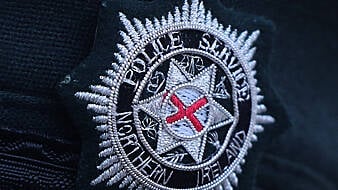A murderer who strangled his partner of three months in her own bed after a two-day drink and drugs binge has appealed his conviction, arguing that gardaí failed to put the contents of their field notes to him in interview.
Sean Nolan (38), with an address at Ashington Crescent, Navan Road in Dublin was convicted in October 2020 by a majority jury verdict of the murder of mother-of-two Amanda Carroll in her apartment at Homestead Court, Quarry Road, Cabra, Dublin 7, on October 21st, 2018.
The former electrician had pleaded not guilty to murder but guilty to her manslaughter. It emerged during the trial that the couple had met three months previously on the Tinder dating app and Nolan had got Ms Carroll's name tattooed on his hand, while she had his name tattooed on her chest. The trial heard they had gone on a "binge-drinking session" at different locations throughout Dublin on the day Ms Carroll died.
The accused and Ms Carroll were involved in a road traffic collision a few hours before the 33-year-old was killed and both fled the scene before being intercepted. Nolan's bloods were taken as there was a concern he was drink-driving or drug driving. However, after being detained in Mountjoy Garda Station for a couple of hours, the pair's drinking session continued into the night.
When the couple returned to Ms Carroll's apartment that night, Nolan put one hand on the neck of the mother-of-two and the other over her mouth after he said she called him by the name of her ex-boyfriend, said she never loved him and tried to hit him.
The trial heard that Ms Carroll died from compression of her neck and mouth which was complicated by the ingestion of sedative type drugs. Ms Carroll's death could not have occurred without asphyxia, but the drugs consumed had an added effect.
Garda notes
At the Court of Appeal today Michael O'Higgins SC, for Nolan, submitted that roadside notes taken by gardaí when they came across the appellant the day after the murder should not have been allowed into evidence.
The trial heard that gardaí found Nolan on a north Dublin street after they had discovered the body of Ms Carroll, with the accused telling them he had “freaked” and spent the day walking around.
Mr O'Higgins said the notes that recorded Nolan telling them "I think I choked her until she passed out" should have been put to Nolan when gardaí formally interviewed him for his response if they were ever to be put before a jury.
Mr O'Higgins said the case was an "extremely finely balanced" one and that the jury had deliberated over five working days before delivering the "narrowest of margins" in returning a ten-to-two verdict of guilty.
The barrister said the core issue of the trial was whether there had been the intention to cause serious injury or death on behalf of Nolan when intoxication was a factor.
Jury decision
Mr O'Higgins said it should not have been left up to the jury of "12 people, selected at random, who are not medical experts" to determine "in a void" the level of intoxication of Nolan on the night and its influence on his intentions.
Mr O'Higgins said the jury came back to the judge to ask if the effect of intoxication on intent could be clarified but that they received none, which, he said, was "too vague",
The barrister said the jury also broke from their deliberations for directions or guidance on the definition of "serious injury" was but again received none and were told it was a matter for them.
"What can be inferred, is that it was a matter that sufficiently troubled the jury and that they wanted guidance," said Mr O'Higgins.
The barrister said that Nolan had told detectives in interview he "wouldn't have gone asleep if I thought she was dead. She was fighting, punching and pushing. It was accidental. I did not set out to kill her."
Mr O'Higgins said the roadside conversation with gardaí had not been put to Nolan in the interview making it "heinous" that different accounts had not been collected, enabling a jury to evaluate both.
"We don't know what else was said - what preceded the short notes or what was said after - which was hammered home by gardaí in evidence who said that he [Nolan] couldn't stop talking," said the barrister. Mr O'Higgins said the level of note-taking by gardaí meant "there must come a stage when standards not being met".
Mr O'Higgins said the two gardaí who arrived at Nephin Road, Dublin 7, to talk to Nolan, who was walking around, were both on a day off. The barrister said that neither had a notebook, which was "a scandal" for gardaí of 25-to-30 years' standing not to have made contemporaneous notes.
Shane Costelloe SC, for the State, said that the two gardaí had not been scheduled for duty that day but that one of them recognised Nolan from being in Mountjoy Garda Station the night before after his arrest for drink-driving.
Mr Costelloe said that Nolan volunteered information and the two gardaí "immediately cautioned him" that he did not have to speak to them after arrest.
Mr Costelloe said Nolan's first comment after being told by the gardaí of Ms Carroll's death was "I probably killed her" and that his first statement made after caution was "I thought I choked her until she passed out".
"I just wanted her to stop. I never wanted to kill her. She was screaming in my face and trying to put her fingers in my eyes," Nolan told gardaí in interview, admitting he "squeezed" Ms Carroll's neck.
"There is no doubt Nolan is explaining that's what he did when he's in the interview. We can call that 'choking' because that's what it was," said Mr Costelloe.
"I don't see any problem writing a note down 20 minutes later. Both gardaí had been off-duty and came to speak to him and cautioned him twice. One discovered they have a piece of paper in the back of the car and they take notes. That is excellent police work," said Mr Costelloe.
Interview
"What he says in interview is exactly what he said on the side of the road. He choked her and wanted her to stop talking," he said.
Regarding claims that the jury sought clarification regarding both intoxication and serious harm, Mr Costelloe said: "There was an extremely detailed charge that went on over days from the judge. They [the jury] asked him to repeat it. It was not a clarification regarding what intoxication could do in relation to forming intent."
"The courts have decided this is exactly why juries are wanted and have to be trusted. We expect them to bring their experience on the evidence introduced. That is exactly what a jury should be for, to resolve those questions," he said.
"Regarding serious harm and the intention to cause it, it is also for the jury to find. If you put your hand over someone's throat and squeeze you are creating a substantial risk of harm, you have to be," he said.
Mr Justice George Birmingham, presiding and sitting with Mr Justice John Edwards and Ms Justice Isobel Kennedy, said the court would reserve its judgement in the matter.







